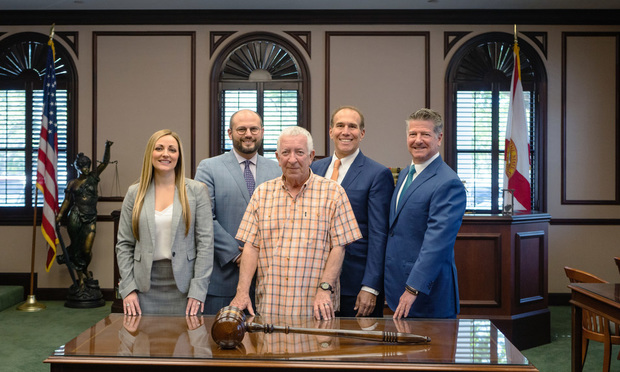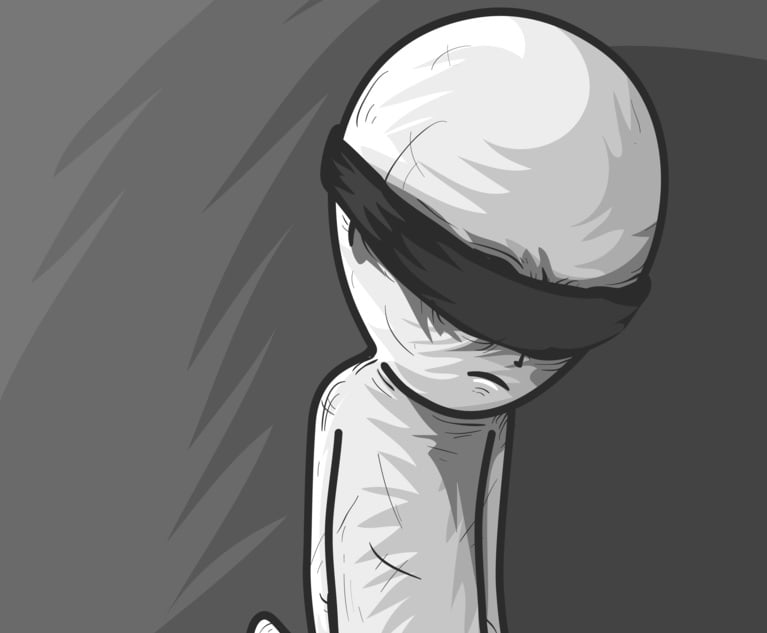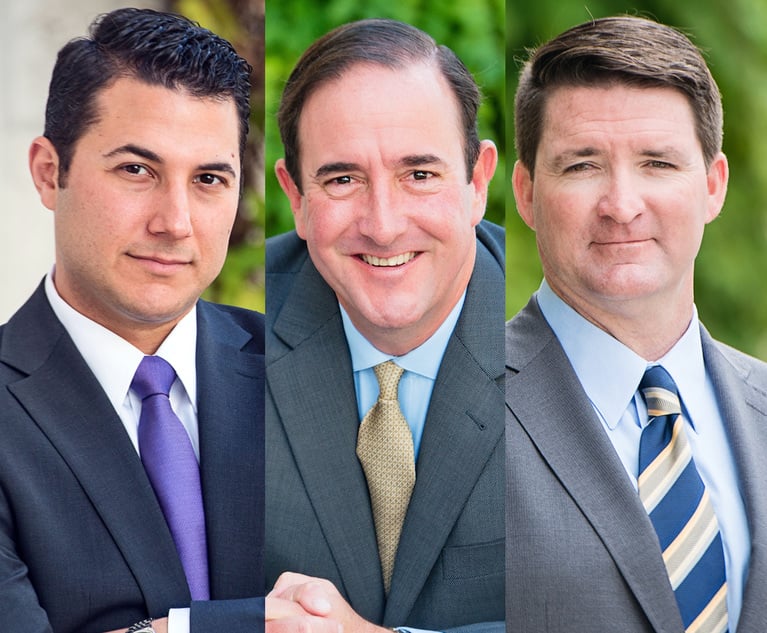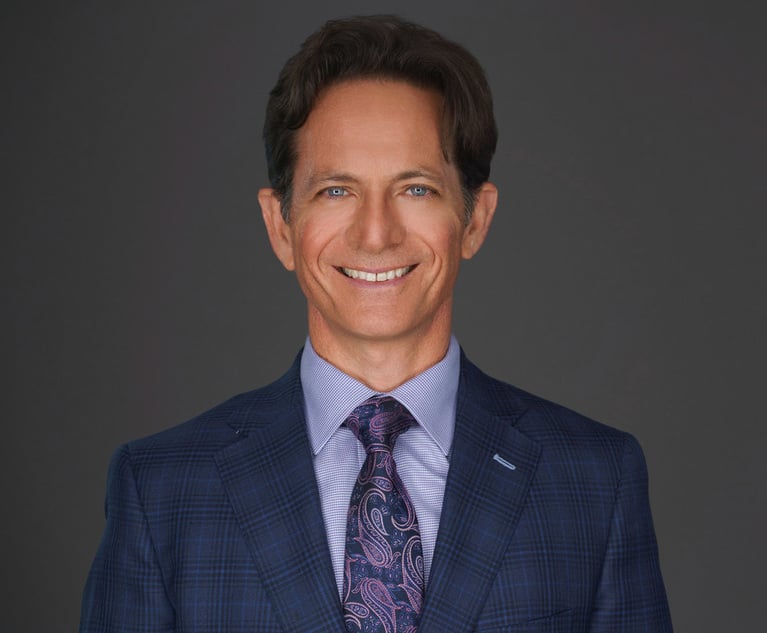How South Florida Lawyers Won $157 Million Verdict in Same-Sex Tobacco Case
The plaintiff's team at the Schlesinger Law Offices in Fort Lauderdale say this same-sex Engle progeny verdict appears to be the first of its kind in the state, and possibly the entire U.S.
November 27, 2019 at 03:00 PM
7 minute read
 From left to right, Schlesinger Law attorneys Brittany Barron, Jonathan Gdanski, plaintiff Bryan Rintoul, Scott Schlesinger and Steven J. Hammer. Courtesy photo.
From left to right, Schlesinger Law attorneys Brittany Barron, Jonathan Gdanski, plaintiff Bryan Rintoul, Scott Schlesinger and Steven J. Hammer. Courtesy photo.
Fort Lauderdale attorneys Scott Schlesinger, Jonathan Gdanski and Steven J. Hammer of the Schlesinger Law Offices obtained a stinging $157 million jury verdict against tobacco giants Philip Morris USA Inc. and R.J. Reynolds Tobacco Co. in a case that could transform tobacco litigation for same-sex couples across Florida.
Plaintiff Bryan Rintoul brought the wrongful death suit on behalf of his husband Edward Caprio, who died at 74 in 2018. Formerly a Delray Beach bookkeeper, Caprio was diagnosed in 1996 with emphysema and chronic obstructive pulmonary disease, which slowly destroys lung tissue. He later contracted lung cancer and had two-thirds of one lung removed.
Caprio's was "not a peaceful demise," according to Schlesinger.
"You can barely get a sip of air," Schlesinger said. "You constantly feel like you're on the verge of not being able to breathe. And it gets worse with aging. As it got worse, they put him on 24 hour-a-day oxygen just so he could get through the day and breathe."
Judge Haimes made it possible
But after Caprio died, it was unclear whether Rintoul could sue on his behalf as Florida law says spouses must have been married before the alleged tobacco-related illness. Rintoul and Caprio had been together since the late 1970s but couldn't tie the knot until same-sex marriage became legal in 2015.
For Rintoul's claims to proceed, Broward Circuit Judge David A. Haimes had to make an exception, finding it would be unconstitutional to apply the rule.
Then came jury selection, when Hammer recalled the plaintiff's team had to weed out would-be jurors with prejudiced views toward gay couples.
"Fortunately, we were able to eliminate the people that had strong feelings about that, and we got a group of people that were open to the idea that a gay couple has the same exact rights as any other married couple should have," Hammer said.
It wasn't the first time the case went to trial. Caprio originally sued in 2007, but that jury couldn't reach a verdict and the second trial was delayed three times, according to Gdanksi, who said Rintoul's stamina was crucial.
"I think this case is a great example of the determination and persistence that is needed by the client and by the lawyer on the plaintiff's side to see this litigation through to the end," Gdanski said. "Because this industry, they depend on outlasting their customers."
Gdanksi said he was in awe of jurors' acknowledgment that Rintoul and Caprio would have married before the diagnosis if the law had permitted it.
"To all of the couples who were not permitted to get married, it speaks, really, volumes to have a jury of six people speak to Brian and Ed, and recognize that they had a meaningful relationship, and that they would have been married earlier if the law permitted it," Gdanski said.
'Testimony from the grave'
The plaintiffs team used testimony from Caprio's earlier trial, when he talked about how he started smoking when he had no idea of the dangers it posed, how he felt he'd been fooled by advertising and misrepresentations, and about the love he and his husband shared.
"It was testimony from the grave, which was I think very powerful for the jury to hear," Hammer said. "Ed and Bryan both testified about how they felt like they were always treated as second-class citizens because they were both gay and growing up in an environment that did not accept it at the time. It was very powerful that the jury accepted them, accepted their marriage, and rendered a verdict."
To prove Caprio was addicted, and that that caused his disease and death, the plaintiffs put on historian of science Robert Proctor of Stanford University, who wrote the definitive book on the tobacco conspiracy to commit fraud by concealment.
Defense attorneys Jerry Furr of King & Spalding in Charlotte, Timothy Congrove, Mary Calderon and Thomas Sherouse of Shook, Hardy & Bacon's Kansas City and Miami offices, and Eric Lundt of GrayRobinson in Fort Lauderdale did not respond to requests for comment by deadline.
Their experts argued Caprio was not addicted and that other factors caused his disease.
The punitive damages phase served as one of the first jury referendums on Juul electronic cigarettes. Because while the defendants argued they'd reformed their practices, the plaintiffs team pointed to evidence of an influx of adolescents addicted to Juul e-cigarettes—and particularly to Philip Morris's moves to invest in the company.
"Juul cigarettes had the predominant share of the market. By buying it and putting their people in charge of running it, they then could capture the future of adolescent nicotine addiction and perpetuate their industry, which is based on addicting youngsters," Schlesinger said.
Although Caprio never smoked Juul, Schlesinger said this evidence went a long way toward obtaining punitive damages for his husband.
Caprio picked up his first cigarette at 15, in 1958, when about 70% of boys his age were doing the same. But times have changed and, now that jurors know about the health risks, it's not always easy for them to imagine a time when it was weird not to smoke.
"Big Tobacco knew better, but 15-year-old Ed Caprio did not," Schlesinger said. "Every step along the way, Tobacco is trying to confuse, industry is trying to distract, and the defendants are trying to make everything about, 'it's all the smoker's fault. It's all Ed's fault.'"
The jury found Caprio just 2% at fault for his death, placing the defendants jointly on the hook for $9 million in compensation and a whopping $74.1 million each in punitive damages.
The defendants have moved for a new trial, labeling the award a "grossly excessive" verdict from a "run-away jury." The motion highlights that punitive damages, in particular, were more than triple what the plaintiff requested.
Schlesinger, however, argued that the defendants earn more profits in a week than they would lose with the verdict.
Read the verdict:
Case: Bryan Rintoul as representative of Edward Caprio v. Philip Morris USA and R.J. Reynolds Tobacco
Case No.: CACE07036719
Description: Products liability, tobacco litigation
Filing date: Dec. 28, 2007
Verdict date: Nov. 7, 2019
Judge: Broward Circuit Judge David A. Haimes
Plaintiffs attorneys: Scott Schlesinger, Jonathan Gdanski and Steven J. Hammer, Schlesinger Law Offices, Fort Lauderdale
Defense attorneys: Jeffrey Furr, King & Spalding, Charlotte, North Carolina; Timothy Congrove, Mary Calderon and Thomas Sherouse, Shook, Hardy & Bacon, Kansas City and Miami; Eric Lundt, GrayRobinson, Fort Lauderdale
Verdict amount: $157 million
More verdicts:
'It Just Didn't Add Up': Miami Lawyers Rebuff $1.5M Suit Over Woman's Walmart Fall
South Florida Lawyers Win $1.35M Tobacco Verdict for Man Without Voice Box
This content has been archived. It is available through our partners, LexisNexis® and Bloomberg Law.
To view this content, please continue to their sites.
Not a Lexis Subscriber?
Subscribe Now
Not a Bloomberg Law Subscriber?
Subscribe Now
NOT FOR REPRINT
© 2025 ALM Global, LLC, All Rights Reserved. Request academic re-use from www.copyright.com. All other uses, submit a request to [email protected]. For more information visit Asset & Logo Licensing.
You Might Like
View All
Automaker Pleads Guilty and Agrees to $1.6 Billion in Payouts

'I've Seen Terrible Things': Lawyer Predicts Spike in Hazing Suits

Florida Retention Ponds Scrutinized in Lawsuit After Latest Child Drowning
Law Firms Mentioned
Trending Stories
Who Got The Work
J. Brugh Lower of Gibbons has entered an appearance for industrial equipment supplier Devco Corporation in a pending trademark infringement lawsuit. The suit, accusing the defendant of selling knock-off Graco products, was filed Dec. 18 in New Jersey District Court by Rivkin Radler on behalf of Graco Inc. and Graco Minnesota. The case, assigned to U.S. District Judge Zahid N. Quraishi, is 3:24-cv-11294, Graco Inc. et al v. Devco Corporation.
Who Got The Work
Rebecca Maller-Stein and Kent A. Yalowitz of Arnold & Porter Kaye Scholer have entered their appearances for Hanaco Venture Capital and its executives, Lior Prosor and David Frankel, in a pending securities lawsuit. The action, filed on Dec. 24 in New York Southern District Court by Zell, Aron & Co. on behalf of Goldeneye Advisors, accuses the defendants of negligently and fraudulently managing the plaintiff's $1 million investment. The case, assigned to U.S. District Judge Vernon S. Broderick, is 1:24-cv-09918, Goldeneye Advisors, LLC v. Hanaco Venture Capital, Ltd. et al.
Who Got The Work
Attorneys from A&O Shearman has stepped in as defense counsel for Toronto-Dominion Bank and other defendants in a pending securities class action. The suit, filed Dec. 11 in New York Southern District Court by Bleichmar Fonti & Auld, accuses the defendants of concealing the bank's 'pervasive' deficiencies in regards to its compliance with the Bank Secrecy Act and the quality of its anti-money laundering controls. The case, assigned to U.S. District Judge Arun Subramanian, is 1:24-cv-09445, Gonzalez v. The Toronto-Dominion Bank et al.
Who Got The Work
Crown Castle International, a Pennsylvania company providing shared communications infrastructure, has turned to Luke D. Wolf of Gordon Rees Scully Mansukhani to fend off a pending breach-of-contract lawsuit. The court action, filed Nov. 25 in Michigan Eastern District Court by Hooper Hathaway PC on behalf of The Town Residences LLC, accuses Crown Castle of failing to transfer approximately $30,000 in utility payments from T-Mobile in breach of a roof-top lease and assignment agreement. The case, assigned to U.S. District Judge Susan K. Declercq, is 2:24-cv-13131, The Town Residences LLC v. T-Mobile US, Inc. et al.
Who Got The Work
Wilfred P. Coronato and Daniel M. Schwartz of McCarter & English have stepped in as defense counsel to Electrolux Home Products Inc. in a pending product liability lawsuit. The court action, filed Nov. 26 in New York Eastern District Court by Poulos Lopiccolo PC and Nagel Rice LLP on behalf of David Stern, alleges that the defendant's refrigerators’ drawers and shelving repeatedly break and fall apart within months after purchase. The case, assigned to U.S. District Judge Joan M. Azrack, is 2:24-cv-08204, Stern v. Electrolux Home Products, Inc.
Featured Firms
Law Offices of Gary Martin Hays & Associates, P.C.
(470) 294-1674
Law Offices of Mark E. Salomone
(857) 444-6468
Smith & Hassler
(713) 739-1250







